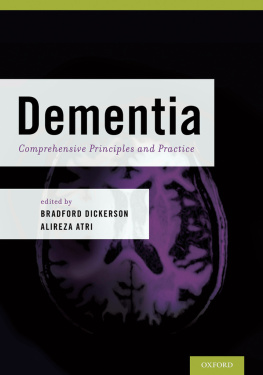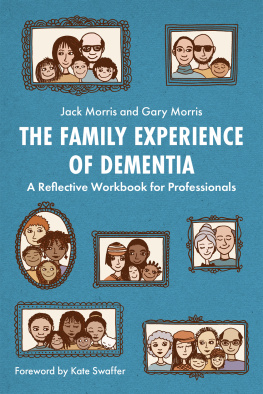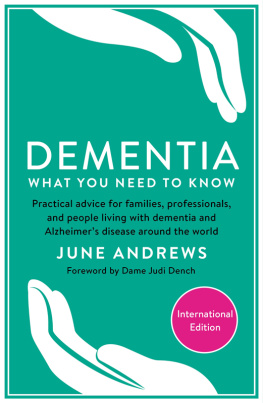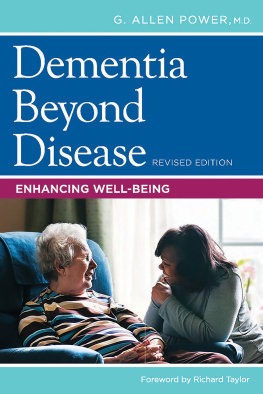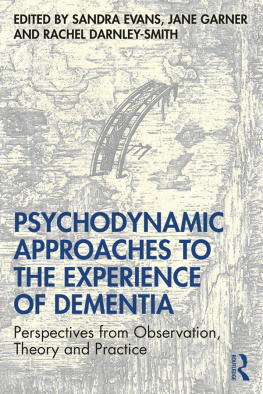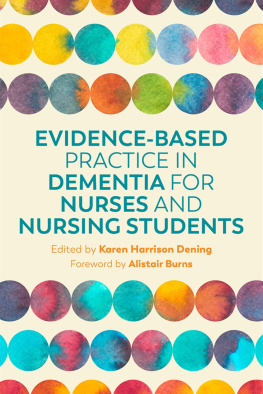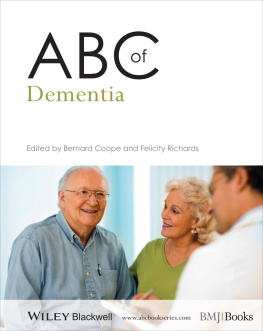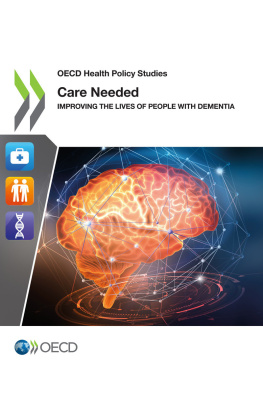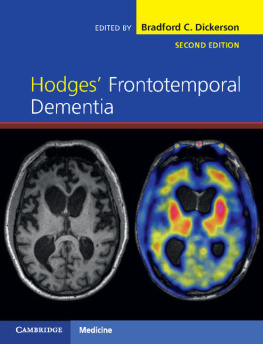Dementia

Oxford University Press is a department of the University of Oxford. It furthers the Universitys objective of excellence in research, scholarship, and education by publishing worldwide.
Oxford New York
Auckland Cape Town Dar es Salaam Hong Kong Karachi
Kuala Lumpur Madrid Melbourne Mexico City Nairobi
New Delhi Shanghai Taipei Toronto
With offices in
Argentina Austria Brazil Chile Czech Republic France Greece
Guatemala Hungary Italy Japan Poland Portugal Singapore
South Korea Switzerland Thailand Turkey Ukraine Vietnam
Oxford is a registered trademark of Oxford University Press in the UK and certain other countries.
Published in the United States of America by
Oxford University Press
198 Madison Avenue, New York, NY 10016
Oxford University Press 2014
All rights reserved. No part of this publication may be reproduced, stored in a retrieval system, or transmitted, in any form or by any means, without the prior permission in writing of Oxford University Press, or as expressly permitted by law, by license, or under terms agreed with the appropriate reproduction rights organization. Inquiries concerning reproduction outside the scope of the above should be sent to the Rights Department, Oxford University Press, at the address above.
You must not circulate this work in any other form and you must impose this same condition on any acquirer.
Library of Congress Cataloging-in-Publication Data
Dementia (Dickerson)
Dementia : comprehensive principles and practice / edited by Bradford C. Dickerson & Alireza Atri.
p. ; cm.
Includes bibliographical references.
ISBN 9780199928453 (alk. paper)
I. Dickerson, Bradford C., editor of compilation. II. Atri, Alireza, editor of compilation. III. Title.
[DNLM: 1. Dementia. WM 220]
RC521
616.83dc23
2014004364
The science of medicine is a rapidly changing field. As new research and clinical experience broaden our knowledge, changes in treatment and drug therapy occur. The author and publisher of this work have checked with sources believed to be reliable in their efforts to provide information that is accurate and complete, and in accordance with the standards accepted at the time of publication. However, in light of the possibility of human error or changes in the practice of medicine, neither the author, nor the publisher, nor any other party who has been involved in the preparation or publication of this work warrants that the information contained herein is in every respect accurate or complete. Readers are encouraged to confirm the information contained herein with other reliable sources, and are strongly advised to check the product information sheet provided by the pharmaceutical company for each drug they plan to administer.
The writing and production of this book have been conducted during early mornings, late nights, weekends, and several vacations. Dr. Atris contributions to this book were conducted both outside his VA tour of duty and his Massachusetts General Hospital/Harvard University/National Institutes of Health research and clinical time. The contents of this book do not represent the views of the Department of Veterans Affairs, the United States Government, Massachusetts General Hospital, or Harvard Medical School.
eISBN: 9780199321728
Dedication
To my mother and father, Jeannae and John Dickerson, who showed me the value and joy of a lifelong love of learning; and my grandmother, Gladys Jastram, and my great-grandmother, Tillie Sorensen, whose strength and kindness inspired me to try to be compassionate in every interaction with patients and families.
Brad C. Dickerson
To my father Seyed Ali Atri, who showed me that giving is the greatest joy in life and that optimism, resilience, and forgiveness are necessary choices; my uncle, A. Hamid Ghodse, M.D., Ph.D., whose character, integrity, and humanity shine as an eternal beacon to guide and emulate; and my aunt, Zahra Daneshmand, whose unconditional kindness, generosity and love sustained and taught me what matters.
Alireza Atri
To all patients, families, caregivers, and colleagues who suffer from and continue to battle these devastating conditions.
Brad C. Dickerson and Alireza Atri
Contents
Creighton H. Phelps
David Caplan
Jeremy D. Schmahmann and Deepak N. Pandya
Kirk R. Daffner and Kim C. Willment
Andrew E. Budson
Kenneth M. Heilman
Etty P. Cortes Ramirez and Jean-Paul G. Vonsattel
Ann C. McKee
Bradford C. Dickerson
Marsel Mesulam
David F. Tang-Wai, Alison Lake, and Neill Graff-Radford
Stephanie Lessig and Irene Litvan
Hamet A. Hanaas, Baar Bilgi, and Murat Emre
Charles DeCarli
Ellis S. van Etten, Steven M. Greenberg, and Anand Viswanathan
Jeremy D. Schmahmann
Alireza Atri
Meredith Wicklund and Ronald C. Petersen
Reisa A. Sperling
Meghan B. Mitchell and Alireza Atri
Sandra Weintraub
Haythum O. Tayeb, Evan D. Murray, and Bruce H. Price
Bradford C. Dickerson
Michael Rafii and Paul Aisen
Clive Ballard and Anne Corbett
James M. Ellison and Cynthia T. Greywolf
Sumer Verma
Licet Valois and James E. Galvin
Barry S. Fogel
The concept of dementia, defined originally as without mind or madness, has existed since ancient times. The term referred to many mental disorders, including schizophrenia, which was originally termed dementia praecox. Gradually dementia became more associated with old age and was often termed senility or senile dementia and was considered by many to be a normal consequence of the aging process. However, it became more apparent late in the 19th century and early 20th century that many dementias occurred earlier in life and were presenile. Others were reversible or sometimes preventable such as the dementia caused by syphilis, if treated early. In the mid-1970s Robert Katzman proposed that presenile dementia and senile dementia due to Alzheimers disease (AD) pathology very likely represented variations of the same syndrome differing only in age of onset. The term dementia as it is used now refers to progressive and severe loss of cognitive abilities that prevent affected persons from functioning normally in society no matter what their age or the underlying cause. Since AD is the most common form of dementia, research in recent years has focused more on AD than other dementias, even though they are sometimes closely related or even overlapping with AD.
Because clinical differentiation among the dementias is sometimes difficult in practice, especially in early stages and, often, more than one underlying cause may contribute to the clinical presentation, diagnosis has been difficult for many clinicians. In recent years guidelines for diagnosis have been developed for many of the dementias caused by neurodegenerative diseases, and they have helped to distinguish among the various dementias. The diagnostic guidelines for dementias due to frontotemporal lobar degeneration, Lewy bodies, vascular changes, and Alzheimers-related pathologies are discussed at length in this volume by respected experts. In addition, the American Psychiatric Association has issued a new version of the Diagnostic and Statistical Manual of Mental Disorders (DSM-5) in which they present neurocognitive disorders as major and minor, and have reclassified the dementias as major neurocognitive disorders.

